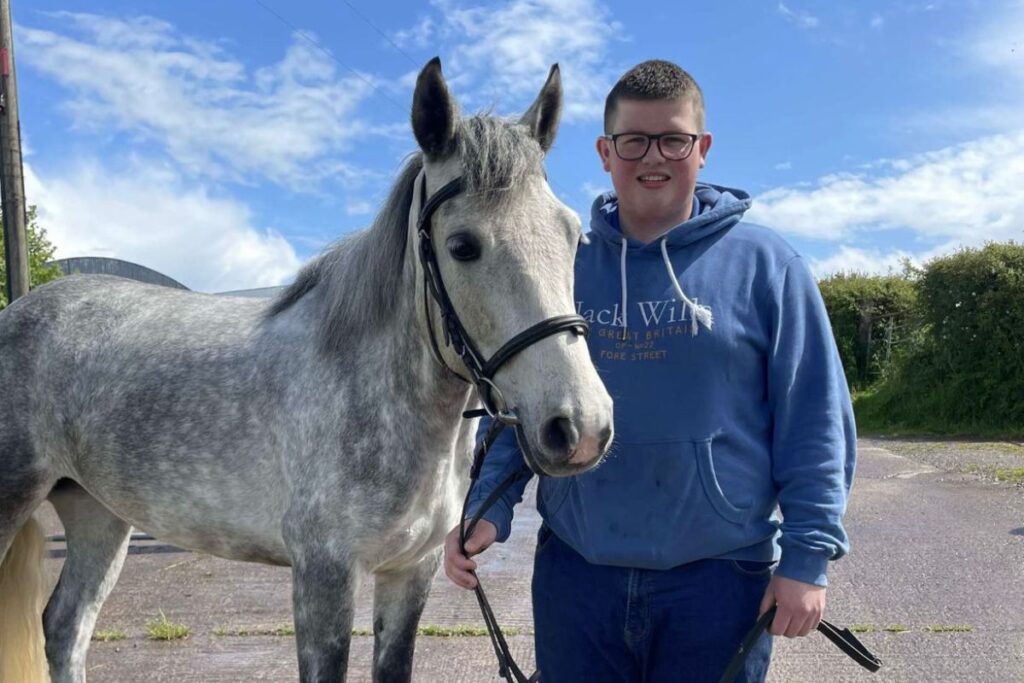That’s Farming editor, Catherina Cunnane, in conversation with Harrison Smith (18), Ballygawley, Co Tyrone in this week’s Student Focus series. He discusses his suckler farming and equine roots, his life-long desire to study vet med, and the Covid-19 pandemic’s impact on his education.
“I was very young when our vet was out doing a C-section on a cow on our suckler farm. The procedure sparked my interest in becoming a vet, and since then, I have never changed my mind about becoming one.
My father has also influenced my career choice as he is as close to a vet without being a vet as you can get. His skills and passion for helping animals have definitely influenced me. The idea of being an on-call vet has always drawn my attention.
My dad, Harold Smith, my brothers, Taylor, Elliott, and Alexander, and I are involved in running the farm – which is home to 90 livestock – in Ballygawley.
My earliest farming memory has to be out checking cows and calves in the summertime on our land.

Suckler farming
We predominately run suckler cows, mainly Charolais, Limousin, and Shorthorn, and pedigree bulls that we produce for hire.
In total, we have approximately 80 suckler cows that we calf on an all-year basis.
We usually buy these females as heifers and then serve them according to breed, size, and conformation.
Calving cows is my primary role on our farm and is one I thoroughly enjoy. We usually keep our heifer calves and sell bulls as weanlings.
We usually keep heifers and breed when they are suitable, seeing a full cycle. As a result, heifers having their own calves is a very rewarding process.
Furthermore, we also keep in the region of 20 pedigree bulls that we hire out to farmers that do not have their own bull. This is an exciting arm of the farm.
On the farm, we also have five horses usually that I buy unbroken and produce for selling. We take a lot of pride in producing quality Sport horses that have pleased many buyers. I usually work with Connemara, Irish Draught, and Irish Sport Horse bloodlines.
During May of last year, we built our own sand school that has allowed me to work horses consistently all year.
It has been a great advancement to our farm and has allowed many high-quality horses to be produced already.
My main interest lies in horses, but caving cows and the management of calves are also very enjoyable aspects.

Vet med
For my GCSE, I went to Aughnacloy College, which was an amazing school where I made many lifelong friends.
Then, for my A-levels, I went to Integrated College Dungannon, which has been an amazing school for me, and in September.
Currently, I am in Year 14 and hope to attend Royal Veterinary College London to study veterinary medicine, providing I get the A-Level results I require, as I have an offer for September.
If I successfully enrol in the course, I hope to become a fully qualified and practicing vet by 2028.
It is a very reputable university, and its facilities are state-of-the-art.
I have completed work experience at Ballygawley Veterinary Clinic, where I saw a lot of interesting practice.
It is a very scary decision, but the prospect of a promising career has kept me going so far. I would say that you cannot become a vet for money or the title. You must have a passion and love animals as it is not an easy way of life.
Covid-19
It is strange for me because I would not change my path, but I wish it were different. Covid majorly impacted my education as I never sat my GCSEs or my AS exams.
Now, I am in the middle of my A-Level exams with very little exam technique and reduced knowledge as a result of the loss of school time.
Lows through my A-Levels have been common as it is a very stressful level to study as the course curriculum is huge and the depth of study is very deep.

Large animal practice
When I graduate, I would like to work in a large animal practice. Small animals are amazing, but I much prefer working on farms alongside farmers with large animals.
I would like to further my studies in animal genetics and the problems you could link with genetics.
Overall, my aim is to provide top-class care to large animals, specifically horses and cattle.
The satisfaction of seeing an animal I helped thrive has influenced my desire to become a vet.
Also, take, for example, after I have helped a cow calf. When I see them out in the field together, knowing that without helping it, it could have been a very different story gives me great satisfaction.
As well as this, comes an understanding and appreciation of the complexity of animal anatomy and how all comes together to form a perfectly functional animal.
A lot of studying is required to obtain the required A levels.
It takes discipline to stay inside and study when I could be out doing something on the farm, but I know I have to put in the hard work now to secure the best outcome from my A-Levels.”
To share your story, email – [email protected]





